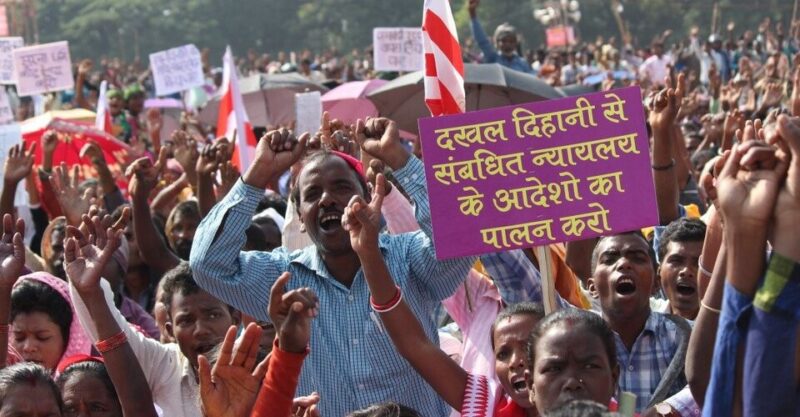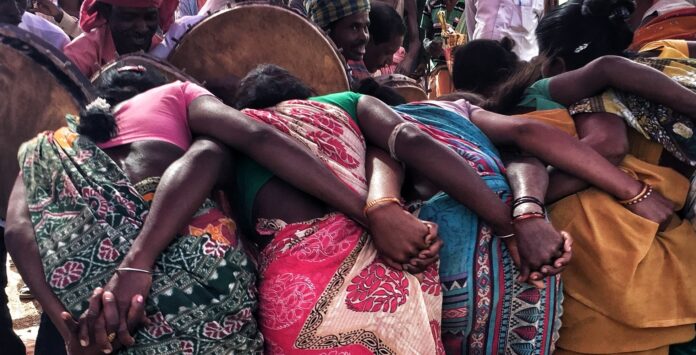The world knows little of the political situation in India. With a conservative regime that considers social protest to be seditious, the Indian state is persecuting Indigenous Peoples and human rights defenders. Tribal communities are the silent victims of growth in the Indian economy. The cases of defender Soni Sori and Jesuit priest Stan Swamy.
At 83 years of age, Father Stan Swamy is recognised as having devoted a lifetime to working for India’s Indigenous Peoples and Dalits, as members of India’s poorest and most discriminated caste are known. On 8 October 2020, the Jesuit priest was arrested at his home on charges of inciting violence at Bhima Koregaon on 1 January 2018, the site of a major riot in which one person was killed and several more injured. He was also singled out as participating in the commemoration of the Elgar Parishad, the 200th anniversary of the battle of Bhima Koregaon. Father Swamy did not attend either event.
The National Investigation Agency (NIA) transferred Stan Swamy to a court in Mumbai and ordered his imprisonment under the Unlawful Activities Prevention Act. As of 15 January 2021, Father Swamy had served 100 days of imprisonment in Taloja Central Jail. The priest suffers from Parkinson’s disease and was denied a glass in his cell for two months. In his application for bail, Swamy alleged that he was being targeted because of “the nature of his writings, his work on caste, the land struggle of India’s peoples and violations of their democratic rights.” For its part, the NIA alleges that Father Swamy has links with Maoist groups.
Stan Swamy is one of thousands of human rights defenders in India. Unlike the criminalisation and persecution suffered in other countries, which are well covered by the international press, the case of India remains largely unknown. When you think of India, you probably think of its economic growth, its software development or Bollywood movies but you rarely consider the suffering of its Indigenous Peoples and their defenders.
Legal instruments to criminalise dissent
Following the May 2014 parliamentary elections, the right-wing Hindu nationalist Bharatiya Janata Party (BJP) came to power with a majority of the seats. The period from 2014 to 2019 was marked by acts of violence on the part of BJP supporters in their staunch defense of the cow, the sacred animal of the Hindus, and attacks on religious minorities.
Following the BJP’s further victory in 2019 with a larger majority, the agenda to turn India into a Hindu nationalist state was stepped up. Narendra Modi’s government repealed Article 370 of the Indian Constitution, which grants special status to the regions of Jammu and Kashmir; granted refuge to non-Muslims from Afghanistan, Bangladesh and Pakistan; and threatened to implement a National Register of Citizens, a move that will affect the rights of India’s Muslim minority.
Also read: NIA Raids Lawyers’ and Activists Residence in Aandhra Pradesh
As a result, mass protests against Hindu nationalist measures have been taking place since May 2019, resulting in state repression. Most of those prosecuted are activists, comedians or journalists. Dissent has become synonymous with opposition to the government and has been typified in the Penal Code and in the Unlawful Activities Act. Both legal instruments are the means by which those who oppose the government and its nationalist programme are prosecuted. Hundreds of people are now in prison under these laws.
It is within this general framework of criminalising dissent in India that the persecution of Indigenous Peoples’ activism is taking place. Living in remote areas, with few means of communication, Indigenous rights defenders are confronting environmental problems and defending their right to self-determination. Their resolve is only deepened by the radicalisation of the government and the general situation in the country.
India is the world’s largest democracy?
Liberalisation of the Indian economy began in 1991. One of the priority objectives was to exploit the natural resources located on Indigenous territories. Anyone calling for respect for the rights of Indigenous Peoples, implementation of environmental safeguards or exercise of their right to freedom of association and assembly was therefore viewed as suspicious.
A classified report from the Indian Intelligence Bureau in 2014 flagged up several non-governmental organisations as being responsible for affecting economic development: “A significant number of Indian NGOs (funded by donors based in the US, UK, Germany, Netherlands and Scandinavian countries) use human rights issues to generate an environment that contributes to stalling development projects.” The document stated that projects in seven strategic sectors had been paralysed due to protests organised by NGOs: nuclear and coal-fired power plants, hydroelectric plants, uranium mines, agricultural biotechnology, industrial mega projects and extractive industries.
Also read: Elgar Parishad case: Stan Swamy’s bail plea rejected by NIA court
Nonetheless, what the report was denouncing as external interference in national policy was, in actual fact, a consequence of the projects being promoted on Indigenous territory. Indeed, in 2001, the Indian state itself recognised that of the 21.3 million people displaced between 1951 and 1990 as a result of development projects, some 8.54 million, or 40.1%, were Indigenous. This figure is even more shocking given that India’s Indigenous Peoples account for only 8% of the country’s total population, according to the 1991 census.
In India, the mere attempt to exercise the right to freedom of association and assembly has become an act of sedition. In the eastern state of Jharkhand, thousands of Indigenous Adivasis were brutally repressed in 2017. Two years later, social activists claimed that some 30,000 tribals had been repressed during a demonstration organised by the progressive Jharkhand Janadhikar Mahasabha coalition. The police produced 29 reports accusing thousands of people but without giving any of their names.
Faced with this repressive dynamic, complaints against and the imprisonment of protesters have multiplied. According to the website Scroll.in, which accessed 19 reports filed by the Police in Khunti district between June 2017 and July 2018, the government charged more than 11,200 people with a range of public disorder-related offences. In 14 of the reports, more than 10,000 people were charged with sedition, an offence under Section 124A of the Indian Penal Code.
Also read: I Have Been Wronged, But My Resolve Has Strengthened: Mandeep Punia
On 29 December 2019, the government-elect in Jharkhand state decided to drop the charges of sedition against Indigenous people. The move came after Hemant Soren, a member of the Adivasi people, was sworn in as the new Chief Minister of Jharkhand. One year on, however, the government has yet to submit an application to the Court to drop the charges. The district committee, comprising the deputy commissioner, the police superintendent and the prosecutor, recommended withdrawing 16 cases, some 60% of the total.
In July 2020, three Indigenous activists identified as Babita Kachhap, Samu Oreya and Birsa Oreya were arrested by the Gujarat Anti-Terrorism Squad (ATS) for allegedly raising funds and instigating the Adivasi community of Tapi and Mahisagar to participate in a violent uprising against the government. They were charged with sedition, promoting enmity between groups, criminal conspiracy and conspiracy to commit a crime under sections 124, 153A and 120B of the Penal Code. The National Commission for Scheduled Tribes directed the Gujarat government and police to provide details of the arrests.

The persecution of defender Soni Sori
The ongoing harassment and arrests of renowned human rights activist Soni Sori is just one example of the situation of Indigenous defenders. On 24 September 2020, Soni Sori tested positive for COVID-19 and began her quarantine. The next day she was due to appear before the National Investigation Agency for the murder of four police officers and Bahama Mandaba, a BJP Member of Parliament, during an alleged Nasal attack in April 2019. Sori informed officials that she had coronavirus but they insisted that she appear in Dantewada. Local travel companies refused to take her because of her illness so she and her nephew Lingram Kodopi were forced to cycle there in heavy rains. Sori was interrogated for more than seven hours even though she was ill. Shortly thereafter, a charge was filed against her for violating quarantine regulations and engaging in the malicious spreading of a life-threatening disease.
Soni Sori had already faced police atrocities such as sexual torture and prolonged imprisonment in the past. In October 2011, she was arrested by the police and spent more than two years in Raipur and Jagdalpur jails, as well as Tihar jail in Delhi. “I was brutally tortured. While in police custody in Dantewada, I was stripped naked and given electric shocks on the orders of Ankit Garg, the then district superintendent of police. Three of his men sexually assaulted me,” Soni Sori alleged in an interview in February 2014. During her hospitalisation at the Calcutta Medical College Hospital, doctors removed stones inserted into her vagina and rectum.
To say that India is in an undeclared state of emergency is an understatement. There is a proliferation of national media headlines reporting on the persecution of prominent journalists and parliamentarians accused of the crime of sedition. And yet Indigenous Peoples’ issues or the cases of those who defend their cause rarely make the news. As India deepens its natural resource exploitation on Indigenous territories, Indigenous rights activists are facing a drastic reduction in the civic space in their country.
First published by International Work Group for Indigenous Affairs (IWGIA).



